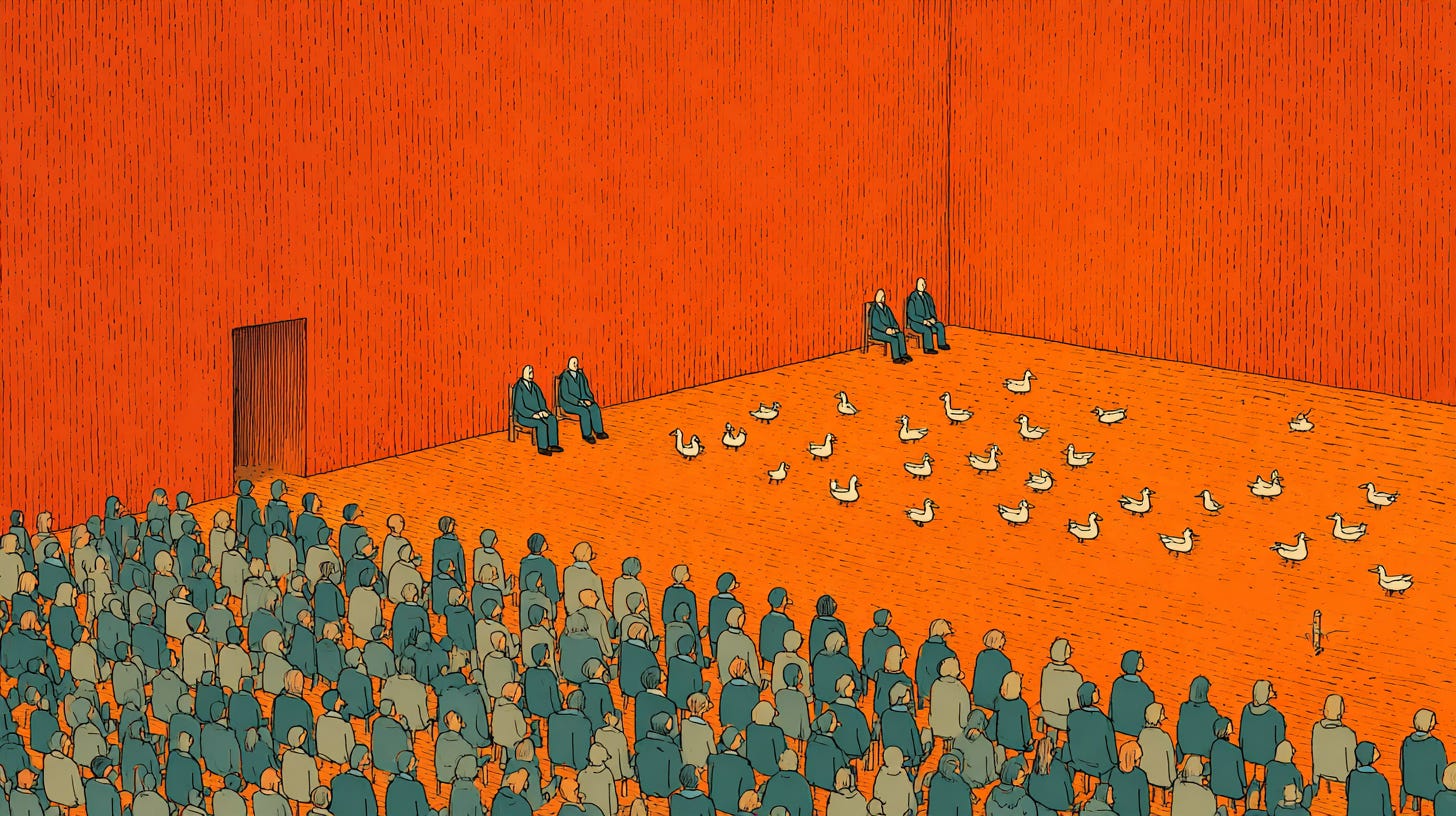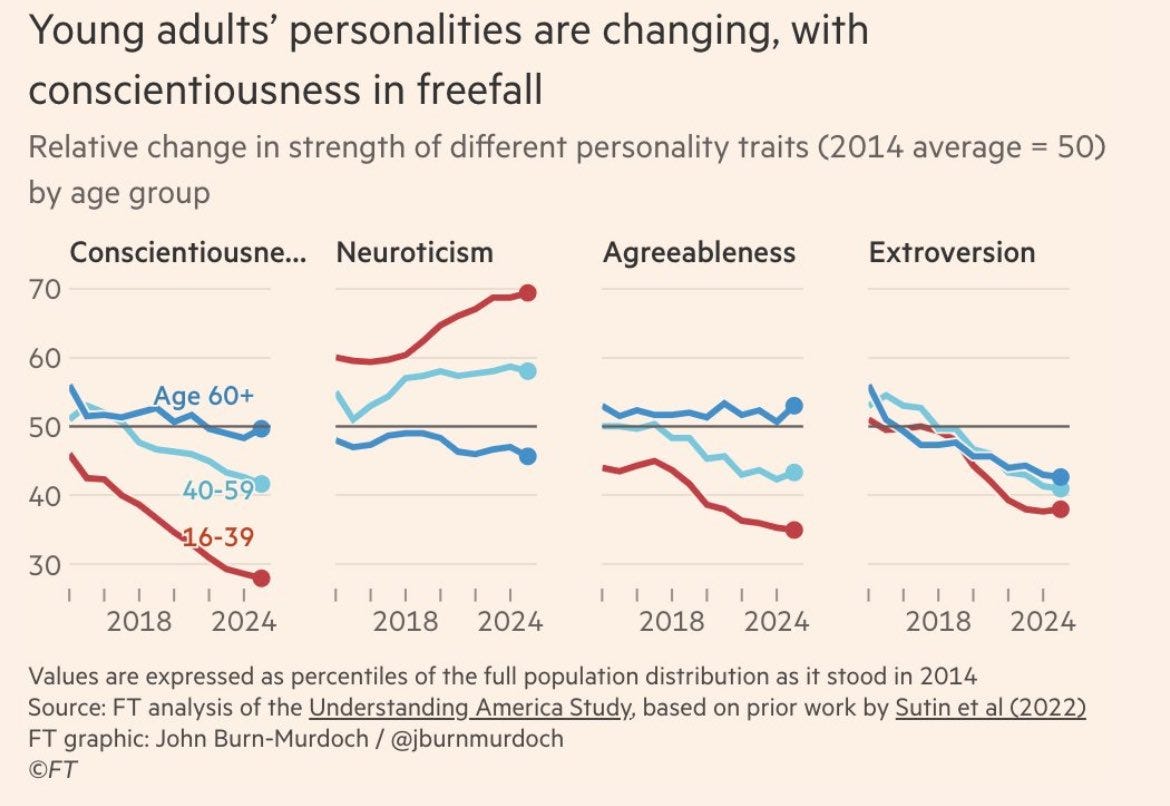The workforce is changing, can culture stay the same?
ALSO: Did we do Big Ange dirty?
The attitudes and personalities of adults are changing in ways we’ve never seen before, with huge declines in conscientiousness and extroversion emerging in the data, and the consequences for the workplace could be profound.
Demographic commentary can very easily tumble into generational blaming but new data from the FT's John Burn-Murdoch this week highlighting a ‘troubling decline in conscientiousness’ goes way beyond clickbait headline grabbing. (Alternative archive link).
Burn-Murdoch took a methodology that tracks the so-called Big Five psychological traits and extended it through to last year. The selling point for the Big Five is that they tend to be predictable over time and prove to be a much more robust way of measuring personality than heavily promoted alternatives like Myers Briggs, which are often styled ‘Work Horoscopes’ in comparison.
As Burn-Murdoch says ‘when researchers have studied the same people they’ve tended to record pretty consistent [Big Five] scores over time’. For example if you are the sort of person who answers ‘I am outgoing and talkative’, or ‘I am the sort of person who makes plans and goes through with those plans’ the data suggests you don’t give a different answer the following week. Scores in traits like conscientiousness (the quality of being dependable and disciplined) have a strong link to professional success.
Changes with Big Five scores are gradual, extroversion gently declines through our lives and conscientiousness increases with age. In a podcast interview with Derek Thompson, Burn-Murdoch explained that the Big Five help group adults into clear archetypes,e ‘are you someone who goes out and gets things done? Do you come up with goals and then make sure that you pursue those goals. Can your friends rely on you?’
Burn-Murdoch’s analysis shows that while all groups are seeing some degree of decline, conscientious is tumbling in a completely unprecedented fashion amongst Gen Z and younger millennial adults. All groups are seeing declines in extroversion - we’re just less sociable than we used to.
Derek Thompson was interviewing Burn-Murdoch as part of a compelling exploration of the research (there’s a link to the conversation below). As part of his analysis he chatted to psychologist Lisa D'Amour who gave him a perspective to the causes of these unprecedented shifts:
‘When it comes to a trend that is observed at the population level, I think we should assume there are many factors at work. Some contenders, one, the pandemic for the extroversion finding, two, the rise of a wellness industry that is often heavily focused on the self as opposed to being focused on others. Three, algorithmically driven digital environments that readily create psychological silos.’
Burn-Murdoch is in agreement that these changes are a consequence of the smartphone age:
‘I think of it as the Two D's, which are distraction and displacement. So distraction, I think, doesn't need a huge amount of explanation. We have these devices now which are always competing for our attention. And we are what we give our attention to. Being conscientious is about delivering on the goals you made for yourself. And distraction, which is almost by definition, is taking you away from what you meant to be doing. Similarly, when it comes to intelligence, the way I've been thinking about whether it's intelligence or consciousness is we have an innate capacity and then we have the deployment of that capacity. And so someone might be super smart, people might be as smart today as ever, even smarter. But if our ability to express those smarts, as it were, keeps getting outcompeted, displaced by or distracted by devices, technology, then we're just not able to bring that to bear in the same way.
Through a workplace lens, this has seriously complicating consequences for all teams and all leaders.
The smartphone, maybe compounded by other societal changes about how and where we do our work is starting to have an impact on our mental health, on our concentration span, and now, it’s starting to change our personalities. We’re becoming less conscientious, less extroverted, less agreeable.
As documented by how immutable these scores have been in the past these things are hard to change, but the best organisations will be the ones who hire for a different mentality. They’ll take actions that build cultures that can differentiate their organisations via a deliberate focus on the behaviours they are instilling in their people.
I could recommend the article and podcast more. We’re in the midst of unprecedented generational change and we all adapt to the world around us.
Read the article (alternative archive link)
Listen to the interview:
Did we do Ange Postecoglou dirty?
For the return of the Premier League there’s a new podcast discussion about Ange Postecoglou and whether a ‘culture coach’ can ever prevail against the urgent time pressures created by the world’s richest sports product. I chat to Dan Jackson a coach in Aussie Rules football about an outsider’s perspective on trying to build culture under a microscope.
Listen: all new website / Spotify / Apple






Is there a connection between lower sociability and decreasing discretionary income? While I wouldn’t suspect it to be the sole driver, not having the income to pursue hobbies, have meals out, etc could be accelerating the change.
Hello